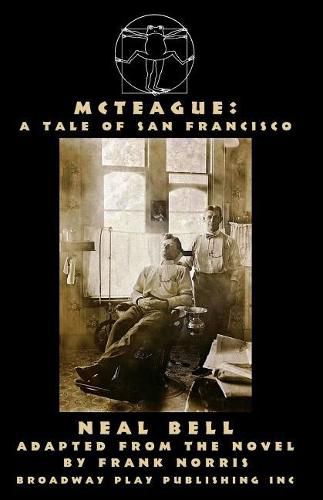Readings Newsletter
Become a Readings Member to make your shopping experience even easier.
Sign in or sign up for free!
You’re not far away from qualifying for FREE standard shipping within Australia
You’ve qualified for FREE standard shipping within Australia
The cart is loading…






This title is printed to order. This book may have been self-published. If so, we cannot guarantee the quality of the content. In the main most books will have gone through the editing process however some may not. We therefore suggest that you be aware of this before ordering this book. If in doubt check either the author or publisher’s details as we are unable to accept any returns unless they are faulty. Please contact us if you have any questions.
Neal Bell’s adaptation of Frank Norris’s novel tells the story of a couple’s courtship and marriage, and their subsequent descent into poverty, violence, and finally murder as the result of jealousy and greed. Frank Norris’s novel McTeague is a panorama of the U S at the turn of the century: cowboys, gold mines, the immigrant experience, the advent of electricity and the movies. At the core is a gruesome cautionary tale, aptly retitled Greed by Erich Von Stroheim when he made a nine-hour film of it in 1923 … In adapting it anew … Neal Bell’s script [tells] a story of downward mobility, about a miner turned dentist (sans diploma) who winds up defrocked and doomed in an abandoned mine. –William A Henry III, Time Bell weaves a thick, dark tapestry of themes from MCTEAGUE’s epic of incidents. Socially, the focus is on the helplessness of a rough simpleton in a rapidly urbanizing and professionalizing America – and on the determination of immigrants and bootstrap-tuggers to cling to the middle class rather than fall into the Victorian abyss of want. Psychologically, it’s on the metamorphosis of McTeague’s innocent ignorance into murderous rage – and Trina’s sensible shift into masochistic self-denial. Morally, it’s on the life-choking consequences of treating money as an end in itself rather than a means toward fulfilling human needs. Each of these levels resonates through the adaptation’s writing. –Scott Rosenberg, San Francisco Examiner
$9.00 standard shipping within Australia
FREE standard shipping within Australia for orders over $100.00
Express & International shipping calculated at checkout
This title is printed to order. This book may have been self-published. If so, we cannot guarantee the quality of the content. In the main most books will have gone through the editing process however some may not. We therefore suggest that you be aware of this before ordering this book. If in doubt check either the author or publisher’s details as we are unable to accept any returns unless they are faulty. Please contact us if you have any questions.
Neal Bell’s adaptation of Frank Norris’s novel tells the story of a couple’s courtship and marriage, and their subsequent descent into poverty, violence, and finally murder as the result of jealousy and greed. Frank Norris’s novel McTeague is a panorama of the U S at the turn of the century: cowboys, gold mines, the immigrant experience, the advent of electricity and the movies. At the core is a gruesome cautionary tale, aptly retitled Greed by Erich Von Stroheim when he made a nine-hour film of it in 1923 … In adapting it anew … Neal Bell’s script [tells] a story of downward mobility, about a miner turned dentist (sans diploma) who winds up defrocked and doomed in an abandoned mine. –William A Henry III, Time Bell weaves a thick, dark tapestry of themes from MCTEAGUE’s epic of incidents. Socially, the focus is on the helplessness of a rough simpleton in a rapidly urbanizing and professionalizing America – and on the determination of immigrants and bootstrap-tuggers to cling to the middle class rather than fall into the Victorian abyss of want. Psychologically, it’s on the metamorphosis of McTeague’s innocent ignorance into murderous rage – and Trina’s sensible shift into masochistic self-denial. Morally, it’s on the life-choking consequences of treating money as an end in itself rather than a means toward fulfilling human needs. Each of these levels resonates through the adaptation’s writing. –Scott Rosenberg, San Francisco Examiner